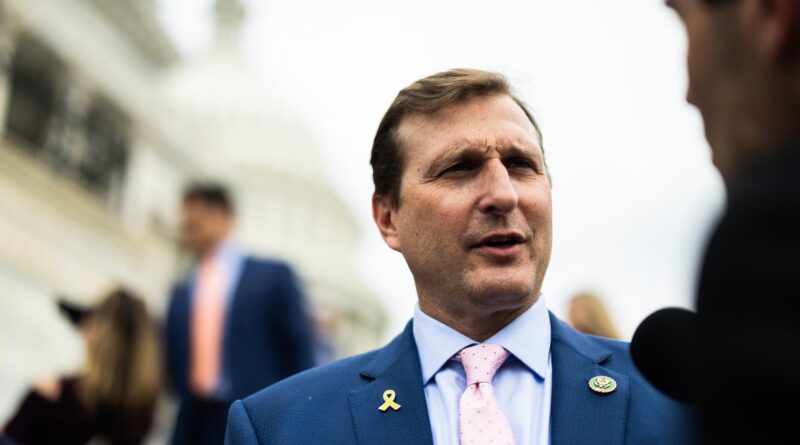Democrats urge Trump administration to ramp up efforts to curb trafficking of U.S.-made guns across border
Washington — A group of House and Senate Democrats is urging top Trump administration officials to use the recent designation of Latin American cartels and gangs as foreign terrorist organizations to take action to curtail the flow of American-made guns across the southern border.
The 14 Democratic lawmakers said in a letter to Homeland Security Secretary Kristi Noem, Secretary of State Marco Rubio and Attorney General Pam Bondi that the designation unlocks additional legal tools that would allow the administration to disrupt the cartels’ financial networks and impose harsher penalties on entities that provide material support to them.
Federal law makes it a crime, subject to fines and up to 20 years in prison, to knowingly provide material support or resources to a foreign terrorist organization. Entities that provide weapons, money, equipment or other support to those groups can face federal prosecution if found liable.
“If you want to really tackle the fentanyl trade, you have to tackle the source of the power of the people who are involved in that trade, and there’s no way to do that without addressing the guns that they receive from American-made manufacturers and dealers,” Rep. Dan Goldman, a New York Democrat who led the letter, told CBS News. “It’s a choice I would say, which is you can’t actually successfully dismantle the cartels without also dismantling the gun trafficking that goes southward that allows them to send the fentanyl trafficking northward.”
The Democrats urged the Departments of Homeland Security, State and Justice to take “immediate” steps to stem the flow of firearms manufactured in the U.S. into Mexico by boosting interagency cooperation to dismantle smuggling rings that facilitate gun trafficking; expanding inspections at border crossings; increasing law enforcement efforts against straw purchased and gun dealers that provide material support to smugglers; and bolstering intelligence-sharing between the U.S. and Mexican authorities and other partners to target weapons traffickers.
“This steady supply of weapons coming in from the north has allowed these criminal organizations to gain control over fentanyl and human trafficking across the border and undermine Mexican law enforcement,” they wrote in the letter. “Put simply, if we do not stop the flow of American-made guns across the southern border to Mexico, we cannot stop the flow of fentanyl into our country over that same border.”
Goldman said the Justice Department should initiate investigations into gun makers and dealers to determine whether they’re knowingly distributing and selling guns to drug cartels, either directly or through straw purchasers.
“The fact that there is an intermediary does not mean that there isn’t a criminal conspiracy that they are a part of, and that the DOJ needs to use this new foreign terrorist organization-designation to apply more pressure on the gun industry to stop the flow of American guns to the cartels,” he said.
Between 200,000 to 500,000 American-made guns are trafficked into Mexico each year, a pipeline that’s been called the “iron river.” Nearly half of all firearms recovered at Mexican crime scenes are manufactured in the U.S., according to data from the Bureau of Alcohol, Tobacco, Firearms and Explosives. Mexico, meanwhile, has just one gun store in the country and stringent firearms laws.
An investigation from CBS Reports exposed how Americans are helping Mexican drug cartels smuggle weapons across the U.S.-Mexico border. Guns are purchased by straw purchasers in the U.S., and a network of brokers and couriers then transport them across the border and into Mexico. U.S. intelligence documents and interviews with current and former federal officials revealed that the federal government has known about the weapons trafficked by cartels for years, but has done little to stop the networks that operate in the U.S..
In an effort to combat the violence wrought by drug cartels, the Mexican government filed a lawsuit in U.S. district court in 2021 against seven of the biggest U.S. firearms manufacturers and one wholesaler. Mexico is seeking $10 billion in damages from the gun industry, as well as other forms of relief.
Firearms manufacturers, though, are seeking to block the suit because of a federal law that shields them from liability for harms stemming from the criminal misuse of their products by another person. The Supreme Court is currently considering whether Mexico’s suit can proceed, with a decision expected by the end of June.
Mexican President Claudia Sheinbaum sought to use the suit as leverage in trade negotiations with President Trump after his administration designated drug cartels as terrorist groups and threatened earlier this year to impose 25% tariffs on Mexican imports.
Mr. Trump agreed in February to a 30-day pause on the tariffs on Mexican imports after speaking with Sheinbaum. Mexico’s president said at the time that the U.S. government is “committed to working to prevent the trafficking of high-powered weapons to Mexico.”
Goldman, who served as lead counsel in the first impeachment investigation of Mr. Trump before he was elected to Congress, said dismantling drug cartels to stop the trafficking of fentanyl and other drugs into the U.S. is a shared goal with the administration and should bring collaboration.
“One component of doing that has got to be stopping the Iron River streamline of American guns going into the cartel’s hands,” he said.
Goldman introduced legislation in the last Congress that aimed to strengthen border security by curbing the trafficking of U.S.-made guns and ammunition across the southern border and said he is working to re-introduce the bill in the current Congress.
Joining Goldman on the letter are: Senators Ben Ray Lujan and Martin Heinrich of New Mexico, Michael Bennet of Colorado, and Catherine Cortez Masto of Nevada, and Representatives Robert Menendez of New Jersey, Eric Swalwell of California, Seth Magaziner of Rhode Island, Lou Correa of California, Debbie Wasserman Schultz of Florida, Jill Tokuda of Hawaii, Nellie Pou of New Jersey, Timothy Kennedy of New York and Gabe Vasquez of New Mexico.

